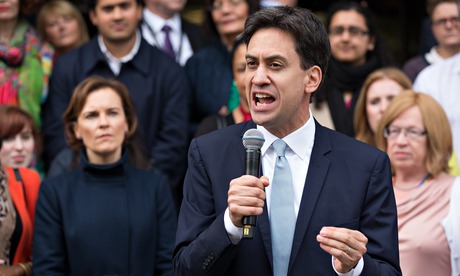Labour leader says he would raise minimum wage to £8 by 2020 in move that 'reveals core party values'
Labour would significantly boost the national minimum wage to more than £8 an hour during the next parliament, giving many of Britain's lowest paid workers an increase of about £60 a week, Ed Miliband has announced.
The plan, revealed in an interview with the Observer on the eve of Labour's annual conference in Manchester, would see the minimum wage climb by at least £1.50 an hour from £6.50 an hour (the rate from 1 October this year) by 2020. The substantial rise would throw down the gauntlet to the Conservative party on low pay, as Miliband prepares to fight next May's general election on a platform of raising living standards for the less well-off.
Miliband says the rise, which would be implemented in stages by the Low Pay Commission in consultation with business, is part of Labour's plan to ensure that hard-working people gain better rewards, and more of the proceeds of economic growth.
The flagship policy reflects Labour's belief that the benefits of economic recovery have failed to cut through to significant swaths of the population and it will be accompanied by a commitment to promote the living wage through public procurement contracts.
One in five UK workers – more than five million people – are categorised as being on low pay, defined as wages of less than £7.71 an hour, or two-thirds of the hourly median wage of £11.56.
Under Labour's proposals – a key plank of its manifesto for government – the minimum wage would increase from 54% to 58% of median earnings by 2020 and then 60% in the following parliament. Miliband said the announcement underlined his commitment to build an economy that rewards all hardworking people, not just the wealthiest at the top.
"It is about values," Miliband says. "It is about saying that this country does not work for millions of working people and we are going to change it. It is not business as usual. It is a proper plan for your future."
Miliband will argue that international evidence shows that countries can support minimum wages at this level with no adverse impact on employment.
The move would give this country a minimum wage similar to those in Australia and European Union countries such as Belgium and Germany, but would still be lower than in France and New Zealand.




